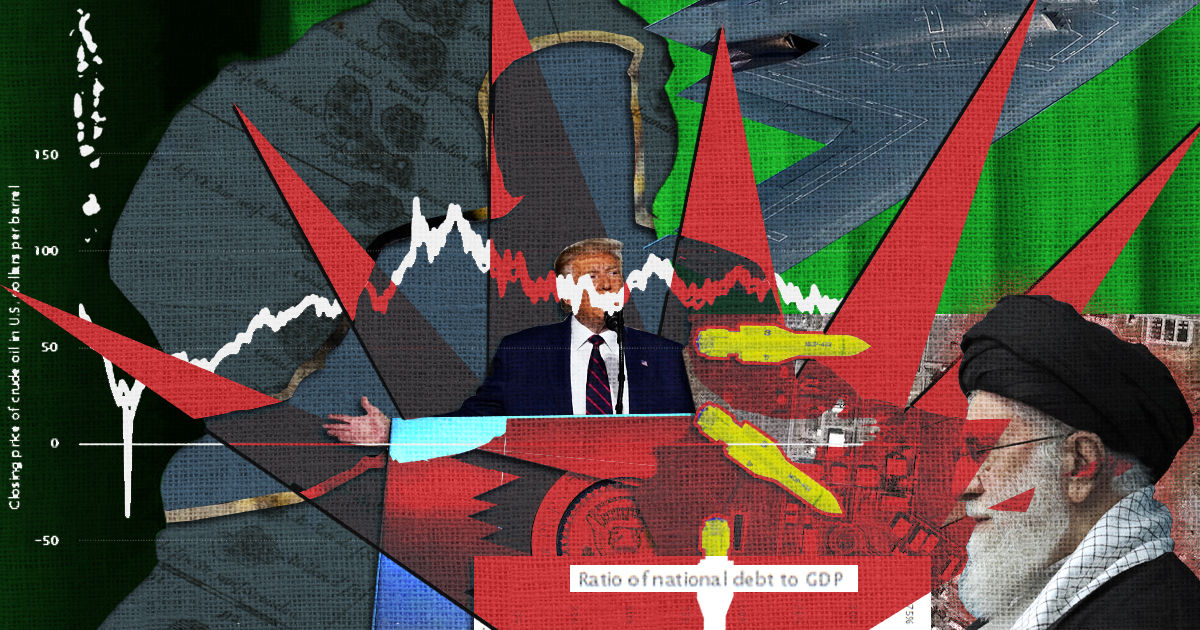Maldives breathes sigh of relief as Iran-Israel ceasefire averts economic catastrophe
An oil price spiral could have devastated the tourism-dependent economy.

Artwork: Dosain
24 Jun 2025, 16:00
The Maldives appears to have dodged a bullet after a fragile ceasefire between Iran and Israel on Tuesday eased fears of a catastrophic oil price spiral that could have devastated a tourism-dependent economy grappling with a severe dollar shortage and looming debt crisis.
The government broke its silence earlier on Tuesday morning after airspace closures across the Gulf on Monday night raised the spectre of economic collapse. Qatar Airways – a crucial lifeline carrying European tourists – cancelled its morning flight to the Maldives.
"The government, under the leadership of [President Dr Mohamed Muizzu], is actively assessing the impact of the situation in the Middle East on our economy, including energy markets, food security, and overall financial stability,” Finance Minister Moosa Zameer tweeted. The government was also “working with relevant institutions to closely monitor market prices, inflationary trends, and trade flow disruptions," he added.
“We remain committed to preparedness and safeguarding the interests of all Maldivians.”
After 12 days of escalating conflict, the assurance came amid growing concern over the extreme vulnerability to oil price hikes as a nation reliant on imports for fuel, food and other essential commodities. As older Maldivians recalled power cuts forced by the first Gulf War in 1991, an opposition lawmaker submitted a resolution on Sunday to ensure that the government was making contingency plans.
Monday night’s scare underscored the peril facing the Maldives economy. With depleted foreign currency reserves barely enough to cover one and a half months of imports and nearly US$ 700 million in debt payments due this year, economists worried about the impact of even a modest rise in oil prices. Op-eds called for greater transparency about plans to manage a potential crisis.
Twin threats
“Right now, it feels like we are caught in a loop, flipping between two sides of the same coin. On one side is the urgent need to avoid a potential sovereign default. That means finding a way to repay the massive sukuk [US$ 500 million Islamic bond] due in 2026,” former economic minister Ahmed Mohamed told the Maldives Independent.
“On the other side is the rising cost of oil. Since we import fuel and pay in US dollars, the government has no choice but to spend more just to keep the country running. This is called imported inflation. When global oil prices go up, the cost of almost everything tied to oil rises with it, from freight and transport to many of the goods we rely on every day,” he explained.
“There is very little we can do to stop it from happening. But the effects will be felt by everyone. Prices will rise, and household budgets will get tighter. The government could try to ease the pressure by cutting import duties or increasing subsidies, but doing that now would be incredibly hard with the limited fiscal space we have.”
Meanwhile, if tourist arrivals decline, “the dollars we depend on will dry up” and the situation could deteriorate as an elevated import bill pushes up demand for foreign currency, he warned.
However, a full-blown crisis appears to have been averted for now. Both Qatar and UAE reopened their airspace last night and Emirates continued scheduled flights to the Maldives. “Some Middle Eastern carriers at Malé Airport experienced delays, but departures are now resuming,” Transport Minister Mohamed Ameen tweeted after midnight.
After the truce was announced, oil prices fell back to US$ 68 per barrel, returning to the level before the Israeli and American strikes on Iranian nuclear sites. But the price of Brent crude, the international benchmark, climbed to US$ 70 per barrel after Israel accused Iran of violating the ceasefire, an allegation that Iran's military denied.
The Maldives remains exposed to future oil shocks if hostilities flare up.
In 2024, the country spent about US$ 700 million on fuel imports, accounting for more than 60 percent of government revenue. When Russia’s invasion of Ukraine drove up oil prices beyond US$ 100 per barrel in 2022, government spending on fuel subsidies to keep electricity tariffs unchanged rose sixfold, ballooning to MVR 3.2 billion (US$ 207 million).
According to the latest fiscal update, the government has spent US$ 123 million on debt repayment as of June 12, whilst maintaining a budget surplus of US$ 84 million.
But the surplus was managed “not because revenues have gone up, but mainly by cutting back on capital spending,” according to Ahmed Mohamed, the former minister and economic policy expert.
“That move seems aimed at getting ready for the US$ 500 million sukuk repayment on the horizon,” he suggested. “But now, with oil prices climbing, subsidies on fuel will also go up. These are not optional costs. They are real and immediate expenses that must be paid.”
Discussion
No comments yet. Be the first to share your thoughts!
No comments yet. Be the first to join the conversation!
Join the Conversation
Sign in to share your thoughts under an alias and take part in the discussion. Independent journalism thrives on open, respectful debate — your voice matters.




